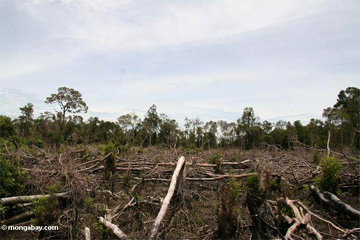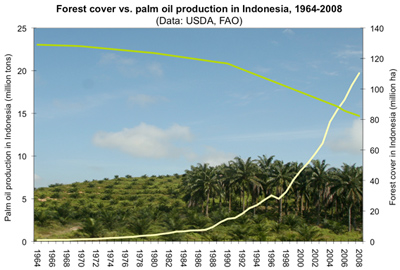The World Bank has agreed to suspend International Finance Corporation (IFC) funding of the oil palm sector pending the development of safeguards to ensure that lending doesn’t cause social or environmental harm, according to a letter by World Bank President Robert Zoellick to NGOs. A recent internal audit found that IFC funding of the Wilmar Group, a plantation developer, violated the IFC’s own procedures, allowing commercial concerns to trump environmental and social standards. The audit’s findings were championed by environmental and indigenous rights’ groups who have criticized World Bank support for industrial oil palm development which they say has driven large-scale destruction of forests in Indonesia, boosting greenhouse gas emissions, endangering rare and charismatic species of wildlife, including the orangutan, and displacing forest communities.
 Deforestation for a new oil palm plantation in Kalimantan (Indonesian Borneo). |
Writing to Marcus Colchester, Director of the Forest Peoples Programme, Zoellick said the IFC has suspended new investments in palm oil projects and ordered a review of existing projects, including the Wilmar Group, on social and environmental grounds.
“I have directed IFC management to take all necessary steps to ensure that the problems identified in the CAO audit are not repeated. Furthermore, until we have a new strategy in place, IFC will not approve any new investments in palm oil,” wrote Zoellick. “I have also asked IFC to review the environmental and social performance of all portfolio investments in palm oil. We are committed to ensuring that positive development outcomes-including environmental and social sustainability-remain at the core of IFC’s development business.”
 |
The Forest Peoples Programme last month demanded that the IFC suspend its support for the palm oil sector in Indonesia until it determines how a long list of violations, ranging from deforestation to land grabbing to human rights abuses, were allowed to continue. The group noted that many private banks “look to the IFC for leadership in their lending procedures and use the Performance Standards to guide them.”
The letter from Zoellick follows.
August 28, 2009
Robert B. Zoellick President
The World Bank
Mr. Marcus Colchester Director Forest Peoples Programme
On behalf of Forest Peoples Programme, Perkumpulan SawitWatch, Lembaga Gemawan, Yayasan, SETARA, CAPPA, Save Our Borneo, ‘Ulu Foundation, and Down to Earth
Dear Messrs. and Mmes. Colchester, Jiwan, Khairnur, Rofiq, Noor, Nordin, Fried, and Marr,
Thank you for your letter of August 14,2009, regarding IFC investments in Wilmar and conditions in the palm oil sector in Indonesia.
I share your concerns about the detrimental effects of palm oil development when sound environmental and social practices are not followed. While sustainable palm oil production can help meet the livelihood needs of the world’s poorest people, and some progress has been made in putting the industry on a more sustainable footing, major challenges remain. IFC has the potential to help improve the industry’s environmental performance under the right conditions. I agree, however, that the CAO audit highlighted important deficiencies in IFC’s past approach.
Therefore, I have directed IFC management to take all necessary steps to ensure that the problems identified in the CAO audit are not repeated. Furthermore, until we have a new strategy in place, IFC will not approve any new investments in palm oil. I have also asked IFC to review the environmental and social performance of all portfolio investments in palm oil. We are committed to ensuring that positive development outcomes-including environmental and social sustainability-remain at the core of IFC’s development business.
The earlier Management Response to the CAO audit outlined in broad terms some of the actions IFC will be taking to correct deficiencies CAO has identified. IFC management has subsequently agreed to a number of additional steps. In response to the CAO audit, IFC will implement the following Action Plan:
- Formulate a comprehensive strategy to guide its involvement in the palm oil sector. As you note, it is essential for IFC to have a strategy for this sector to provide a framework within which it will conduct its investment operations and advisory services, and engage with stakeholders. We also agree that consultation with stakeholders, including industry, financial institutions, civil society, and indigenous peoples’ organizations, is a critical part of developing the strategy. I hope that you will contribute actively to this process. The strategy must define the basis and manner in which IFC uses its investments and advisory work to support implementation of more sustainable practices among firms engaged in palm oil-whether as producers or as traders. As an integral part of the strategy, IFC will work only with clients who are committed to achieving internationally recognized certification of their operations. Development of the strategy will also provide an opportunity to analyze the broader issues you mention regarding the sector in Indonesia. IFC is now preparing an interim guidance note and is formulating the consultation process to provide input into the strategy. Our aim is to complete the development of this comprehensive strategy within six months.
Increase IFC engagement in and support of the RSPO and associated standard-setting process. We agree that bodies such as RSPO play an important role in raising standards in the sector, although they of course are not a substitute for compliance with IFC’s own Performance Standards. IFC will support and work directly with the RSPO’s Greenhouse Gas and New Plantings working groups and will provide input to the Smallholder Working Group. IFC, through the Biodiversity and Agricultural Commodities Program (BACP), is already supporting the RSPO’s Biodiversity Working Group, and the BACP has already approved several pilot projects related to biodiversity issues on palm oil plantations.- Develop and implement an Advisory Services program targeting the palm oil sector in Indonesia, with special attention to improving the capacity of smallholders/suppliers. We will seek to define this program in consultation with industry, financial institutions, civil society, and indigenous peoples’ organizations. Possible areas of focus include: promotion of fair labor practices; promotion of best practices in land tenure/community consultation in association with leading palm oil producing firms; improvement of the enabling environment at the sub-regional level to encourage more widespread adoption of RSPO standards; promotion of RSPO to regional financial institutions; and promotion of community conflict resolution regimes. We are designing this program now and beginning consultations immediately.
-
Revise IFC’s Environmental and Social Review Procedure to clarify categorization of trade finance investments to ensure that single-commodity, single-company trade finance facilities in environmentally and socially sensitive sectors are categorized based upon potential impacts. Categorization of these projects as “COO was consistent with the then current
categorization system for transactions channeled through financial intermediaries, although I understand the staffs debated whether we should take additional action at the time of the investment. In recognition of the shortcomings of the previous system, we are making this change, effective as of August 14,2009, to provide more precise guidance to staff. It is likely to result in categorizing these projects as an “A” or “B,” depending on identified risks.
Strengthen implementation of the existing prohibition against clearing of critical habitat (as defined in IFC Performance Standard 6) or High Conservation Value Forest (as per RSPO Principles and Criteria). In all projects IFC uses Performance Standard 6 to ensure that no critical habitat, including primary forest and sensitive peatlands, is harmed. IFC Performance Standard 6 has been in place since 2006. In the case of the Wilmar plantation companies in Indonesia, we believe on the basis of our analysis and supervision that there was no clearing ofprimary forest, nor were they using burning to clear land for planting.
Subject to reaching agreement with Wilmar, and as part of IFC’s ongoing supervision of Delta-Wilmar, assess the status of the company’s environmental and social performance, as well as its existing relationship with local communities affected by its plantation operations, and recommend improvements as necessary. Upon agreement with Wilmar, an IFC environmental and social specialist team will visit Wilmar plantations and a sampling of locally-affected communities by the end of November.
As you know, we are conducting a comprehensive review of lFC’s Policy and Performance Standards on Social and Environmental Sustainability later this year and next. The review will help to ensure that environmental and social sustainability are at the core of lFC’s activities. The first phase of consultation, focusing on identifying the key issues and challenges, will begin in mid-September, with the full review expected to be completed by the end of 2010. The review will involve extensive public consultations and solicitation of inputs from stakeholders-a process in which I hope you will also actively participate.
IFC also now subjects any proposed project involving a company in whose other investments the CAO is already active, either as auditor or mediator, to an additional review by senior management to determine whether or not to proceed. In addition, IFC will highlight any issues for Board members. I have also asked IFC management to meet with Board members to discuss the concerns raised in your letter and IFC’s action plan going forward.
As you will see from the above, I share your views about the needs to revise categorization procedures and to prepare a new comprehensive strategy for the sector, including interim notes. I do not, however, believe that our staff committed systematic policy violations. I understand that staff conducted an overview of a number of Wilmar plantations, including selected site visits, and that due diligence concluded that overall these operations were being managed in the spirit of the draft principles of the RSPO. Nonetheless, it is clear that we must have higher levels of due diligence and clearer guidance to staff. That is why the action plan includes steps to ensure that similar projects are handled differently in the future.
I believe these actions, taken together, will strengthen the capacity of IFC to be a positive force for change. However, it is also clear that IFC’s interventions cannot be undertaken in isolation. We are exploring the scope for greater collaboration across the World Bank Group in addressing issues in the palm oil sector in Indonesia. To achieve our common aims, we will need the coordinated
efforts of civil society organizations such as yours, along with the private sector, all levels of government, industry associations including RSPO, and other multilateral institutions.
Thank you again for your letter. You raised a number of important points. I hope that you will actively contribute to the consultations on the strategy and the Performance Standards review, and we look forward to working with you to improve IFC’s performance in the palm oil sector.
Sincerely,
Robert B. Zoellick
Related articles